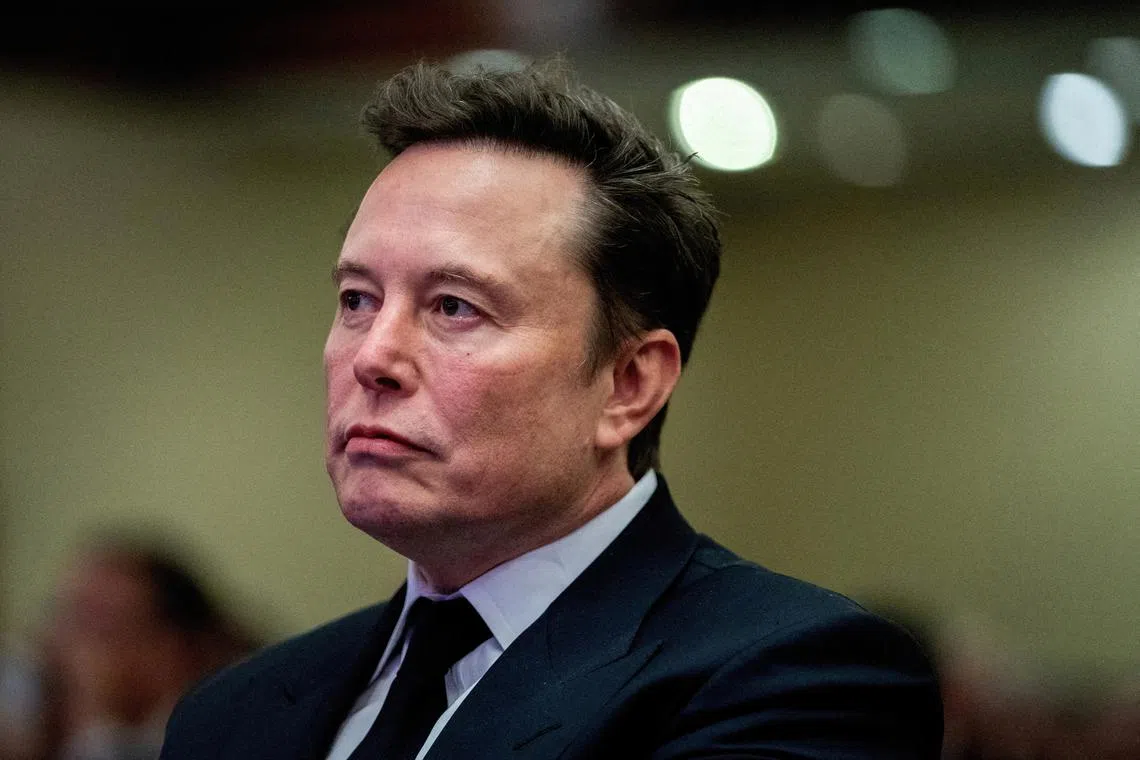Anger in Germany after Musk backs country’s far right
Sign up now: Get ST's newsletters delivered to your inbox

It is not the first time Mr Musk has weighed in on German politics.
PHOTO: REUTERS
FRANKFURT - A post from Mr Elon Musk on his platform X claiming that only the far-right Alternative for Germany (AfD) party can “save Germany” sparked accusations on Dec 20 that he was seeking to interfere in the country’s upcoming election.
The billionaire, set to play a key role in US President-elect Donald Trump’s administration as “efficiency czar”, posted the message over a video commentary about the leader of Germany’s centre-right Christian Democratic Union (CDU) party, Mr Friedrich Merz.
The video criticised Mr Merz – who polls say is on course to become the next chancellor after February elections – for his refusal to work with the anti-immigration AfD, currently polling in second place.
Following a deadly car-ramming attack
The German government has avoided strong comment, but lawmakers from across mainstream parties, which have all ruled out cooperating with the AfD, reacted with outrage to Mr Musk’s comment about the party.
He doubled down later in the day, saying AfD is “obviously not ‘far right’! Just common sense policies”.
Mr Dennis Radtke, a member of the European Parliament for CDU, spoke out forcefully.
“It is threatening, irritating and unacceptable for a key figure in the future US government to interfere in the German election campaign,” he told the Handelsblatt daily.
Germans are set to go to the polls on Feb 23
Mr Radtke called Mr Musk a “threat to democracy in the Western world”, accusing the world’s richest man of turning social media platform X, previously called Twitter, into a “disinformation slingshot”.
Mr Axel Schaefer, a lawmaker from Mr Scholz’s centre-left Social Democrats, said Mr Musk’s post was “completely unacceptable”.
“We are very close to the Americans, but now bravery is required towards our friend. We object to interference in our election campaign,” Mr Schaefer told the Tagesspiegel daily.
Former finance minister Christian Lindner, from the pro-business Free Democratic Party, said that some of Mr Musk’s ideas had “inspired” him but urged the Tesla boss not to “rush to conclusions from afar”.
“While migration control is crucial for Germany, the AfD stands against freedom, business – and it’s a far-right extremist party,” tweeted the politician, whose fallout with Mr Scholz triggered the coalition’s implosion.
Mr Scholz himself was restrained when asked about Mr Musk’s comments, noting: “We have freedom of expression, which also applies to multi-billionaires.”
He added that this “means that you can say things that are not right and do not contain good political advice”.
Musk meddling concerns
For its part, the AfD warmly welcomed Mr Musk’s praise, with co-leader Alice Weidel thanking him in a video message and saying her party was “the one and only alternative for our country”.
At a regular press conference in Berlin, a government spokesman avoided commenting directly on Mr Musk’s post, reiterating Mr Scholz’s point that Germany respects freedom of expression.
But she added the government was worried about “how X has developed in recent years, especially since Elon Musk took over”.
Despite such concerns, the government had decided not to close its accounts on the platform as it remained an important channel for reaching out to people, she said.
It is not the first time Mr Musk has weighed in on German politics.
In November, he tweeted in German that “Olaf is a fool” after the collapse of Mr Scholz’s government – with the chancellor responding that the comments were “not very friendly”.
And, in 2023, Mr Musk said Berlin-funded migrant rescue operations in the Mediterranean could be seen as an “invasion” of Italy.
Tesla has a factory outside Berlin, and Mr Musk visited Germany ahead of the last national elections in 2021, meeting Mr Armin Laschet, who was then the candidate for the CDU/Christian Social Union bloc to become chancellor.
Mr Laschet went on to lead the conservatives to their worst-ever results at the polls.
There have also been concerns in Britain that Mr Musk is taking a close interest in the country’s political scene, appearing to cosy up to hard-right firebrand lawmaker Nigel Farage. AFP


